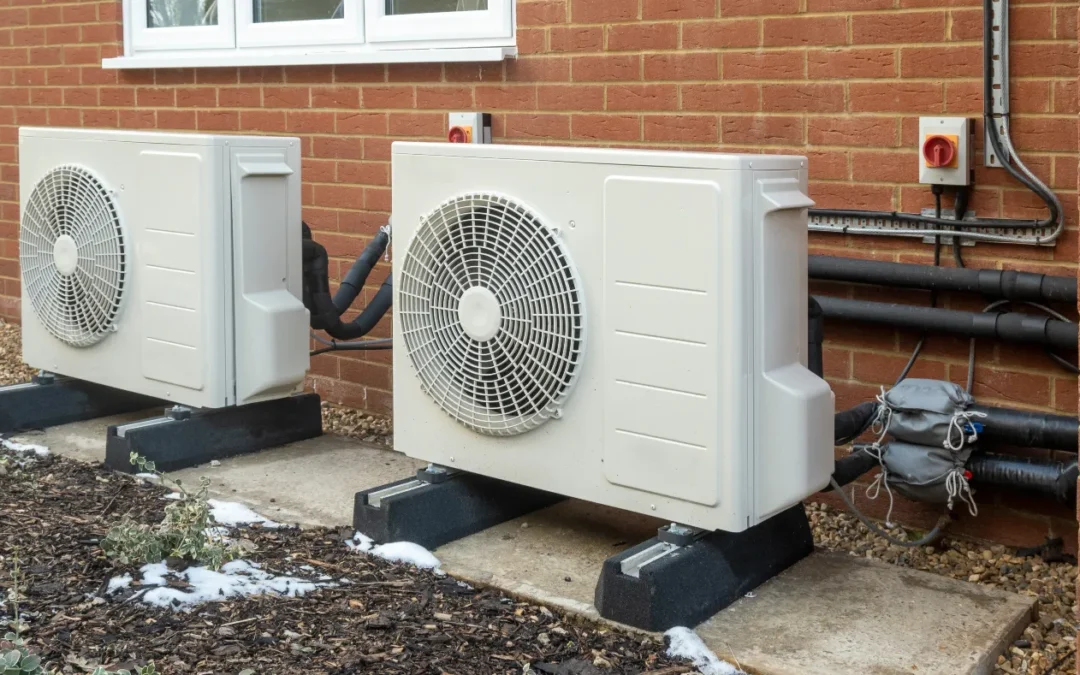Air source heat pumps are one of the most efficient ways to replace an outdated gas boiler. They are a low-carbon, renewable energy solution with advantages over other options such as oil and LPG heating systems.
Selecting a heat pump for your property depends on several variables, and expert advice from the Gas Worx team is advisable to ensure you understand how different models compare, the size of the heat pump you require, and how the energy efficiency and insulation currently within your property may impact your decision-making.
Let’s look at the essential information you need to know and some things to consider when choosing between different types of air source heat pumps.
How Does an Air Source Heat Pump Work?
Air source heat pumps extract heat from the external air, turning that into water, which is used to heat radiators, underfloor heating and stored water in a cylinder to keep your property warm, and water hot.
The heat within the air is absorbed into an in-built fluid, which moves into the heat pump through an exchanger, which increases the temperature and transfers the heat into the water.
Because these heat pumps primarily use natural energy sources, they reduce the carbon emissions produced by a considerable volume. A professionally installed, high-performance pump is normally expected to last around 20 years – twice that of a conventional boiler.
What Will Affect the Right Air Source Heat Pump for My Home?
The first consideration is the size of the heat pump you need – pumps start at 5kW and go up to 16kW, so you need to evaluate the size of your home and the number of rooms, plus the heating system in place. Large properties with extensive underfloor heating and two or more bathrooms will inevitably require a larger air source heat pump than a smaller residence.
On average:
- A property of roughly 100 square metres with three bedrooms is suited to a 5kW sized air source heat pump.
- Homes of 200 square metres usually need a heat pump of at least 10kW.
Your insulation is also relevant, because if the property is not well insulated, you will need a larger heat pump. In some cases upgrading your insulation and other aspects of energy conservation, such as single glazing, may be advisable.
Heat pumps must be correctly sized because if the pump is excessively large, it will generate more heat than required and will short cycle, which can affect the heating system’s longevity.
Conversely, a heat pump that is too small will be put under unnecessary pressure and work less efficiently while having to strain to reach maximum output.
Booking a consultation or home visit with your local Gas Worx team is the best option – we can arrange a convenient time to visit and offer advice about the suitable air source heat pump models based on the above factors.
However, the scale of your property is one of many elements that will dictate the right air source heat pump for you.
Outdoor Temperatures
One part of the home assessment process is considering the average air temperatures in your local area. Fortunately, here on the south coast, we don’t tend to experience freezing, icy temperatures for much of the year, and the ambient air temperature is considerably warmer, on average, than you might expect in the Highlands or at higher elevations.
Air temperatures are evaluated to determine the correct size of the heat pump, as the pump works by absorbing heat from the air outside and passing it through exchanger coils. The warmer the air, the more efficient the heat pump.
Therefore, you may need a smaller heat pump for a property in a sheltered region than you might for a home exposed to the colder coastal air since wind chill contributes to air temperatures.
Heating Demands
When we visit a property, we always ask about your preferences because homeowners may have different requirements in terms of the warmth they find most comfortable.
Most people aim for an average internal temperature of 21°C, but if you wish to install an air source heat pump with a warmer target, you may require a larger heat pump.
Gas Worx can also assess the heat loss from your home because the contrast between the outdoor and indoor temperatures will indicate the performance requirements your heat pump must meet to maintain a consistent temperature.
There are lots of factors here, such as:
- Measuring the heat loss from the property.
- Assessing the size and number of radiators.
- Checking whether underfloor heating is in place.
- Analysing the efficiency of your insulation.
From here, we can establish the correct heat pump size and recommend the appropriate models that will meet your needs while adhering to your budget, using knowledge of your EPC rating to make independent recommendations.
Further Considerations in Picking the Right Air Source Heat Pump
Air source heat pumps are undoubtedly an efficient, future-proof home heating solution, but we always take the time to explain the practicalities to ensure we suggest the most suitable heat pump, for example:
- Space availability: You will need space to install a unit on the wall or ground outside with sufficient airflow. Monobloc air source heat pumps comprise one outdoor unit, whereas split systems have separate components installed indoors and outside.
- Noise generation: the heat pump unit generates a low noise level when fans operate, although this is similar to a fridge from around two metres away.
- Water storage facilities: heat pumps don’t work on demand in the same way as a combi boiler, so a hot water cylinder to store and retain the heated water is ideal.
The total cost of installing an air source heat pump depends on all of these factors, ranging from around £6,000 to £12,000, so it is important to work with an experienced installer to ensure you understand all the variables that will affect the right model for your home, including the complexity of the required system, and the current layout and heating devices within your property.
Please contact the Gas Worx team at any time for further guidance or to arrange an independent consultation to help you make informed decisions.






